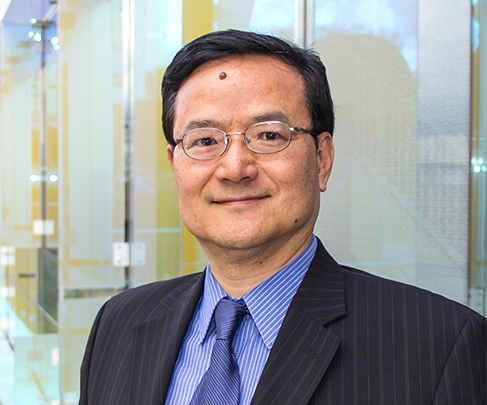New Biomedical Engineering Dept. Head Bin He arrives on campus
As of February 1, the College of Engineering welcomed new Department Head of Biomedical Engineering Bin He to campus as he began his appointment. Dr. He succeeds Yu-li Wang, the R. Mehrabian Professor of Biomedical Engineering, who has served as Department Head since 2008.
As of February 1, the College of Engineering welcomed new Department Head of Biomedical Engineering Bin He to campus as he began his appointment. He succeeds Yu-li Wang, the R. Mehrabian Professor of Biomedical Engineering, who has served as Department Head since 2008.
As Department Head of BME, He is committed to research and education at the convergence of engineering, biology and medicine, aiming to produce future leaders and innovators to address grand challenges in medicine and health through engineering innovation. He is excited to join the faculty at Carnegie Mellon, and has relocated his lab, the Biomedical Functional Imaging and Neuroengineering Laboratory, to the Carnegie Mellon campus.
“The intellectual community and setting at Carnegie Mellon fit very well with my philosophical understanding of biomedical engineering,” says He. “Biomedical engineering can be pushed from biomedical sciences or from engineering, and CMU is the ideal place to advance biomedical engineering through engineering innovation at one of the finest engineering schools in the world. I’m extremely excited and very much looking forward to surrounding myself with this exceptional intellectual environment and with the top notch people in the College of Engineering, in Robotics, and in the Artificial Intelligence community at Carnegie Mellon.”
Whereas many of the interfaces between computers and the human brain require sensors to be implanted in the brain, He’s pioneering biomedical engineering research has changed our understanding on what noninvasive techniques for brain-computer interfaces can do for the development of mind-controlled robotics. He’s primary research goal is to develop novel engineering technologies that can understand brain dynamics, and to leverage these capabilities to develop next-generation neurorobotics.
Biomedical engineering can be pushed from biomedical sciences or from engineering, and CMU is the ideal place to advance biomedical engineering through engineering innovation.
Bin He, Department head, Biomedical Engineering, Carnegie Mellon University

Source: Carnegie Mellon University College of Engineering
Professor Bin He has joined the College of Engineering as the new Department Head of Biomedical Engineering.
One area of He’s research is to improve noninvasive dynamic brain imaging technologies so that they are faster and more spatially precise. The conventional electroencephalography (EEG), while used in every clinic in the world, is essentially a one-dimensional technique that does not provide information about the distributed nature of brain activity. He’s research is to use the very small electromagnetic signals generated by neurons to produce dynamic three-dimensional images of the brain function and dysfunction.
“Essentially, we attempt to read the extremely small electromagnetic signals generated by neurons, which is equivalent to a small boat in the Atlantic Ocean during a storm. How do you pick up that small signal in such a noisy environment? It is a major scientific and technical challenge to sense, localize, and image signals noninvasively from targeted neurons considering our brain has about a hundred billion neurons. I have been spending my entire life pushing EEG technology in this direction.”
This research earned He the IEEE Biomedical Engineering Award, the highest honor IEEE can bestow to a member or nonmember in the field of biomedical engineering. He has also received several other prestigious awards, including the Academic Career Achievement Award from the IEEE Engineering in Medicine and Biology Society, as recognition for his research contributions and commitments to interdisciplinary education. He was formerly President of the IEEE Engineering in Medicine and Biology Society and Chair of Publications Committee of the American Institute of Medical and Biological Engineering, and is Chair-Elect of the International Academy of Medical and Biological Engineering. He has served on numerous editorial boards and conference committees, and is the Editor-in-Chief of IEEE Transactions on Biomedical Engineering. He is a Member of the NIH BRAIN Multi-Council Working Group.
“We are very excited to welcome Professor Bin He to the College of Engineering community,” says Jim Garrett, dean of the College of Engineering. “His pioneering work has transformed electroencephalography into an important dynamic, three-dimensional neuroimaging modality for noninvasive brain research and management of brain disorders. As a renowned scholar and a recognized and highly regarded leader, we are certain that Dr. He will be an exceptional leader of the Department of Biomedical Engineering.”
